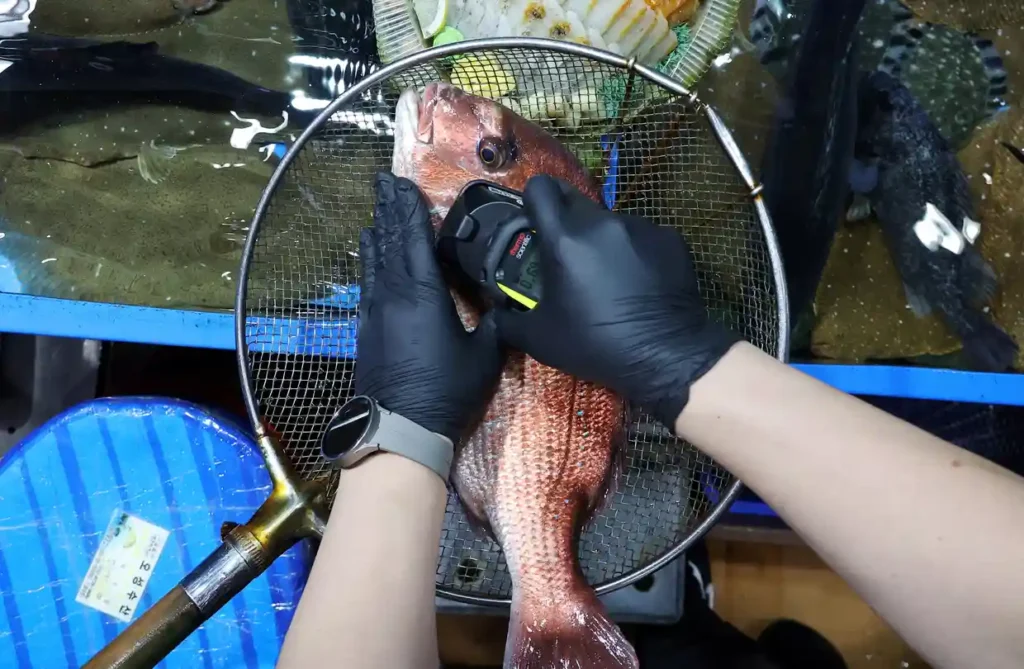Fukushima Water Release Fears: Fish with 180 Times over Legal Limit of Radioactive Cesium Caught
ENVIRONMENT, 31 Jul 2023
Gavin Blair | The Guardian - TRANSCEND Media Service
Black rockfish caught close to disaster-hit nuclear power station is one of dozens caught in the past year above the legal safety limit.

An official in South Korea measures radiation levels of a fish imported from Japan. A fish has been caught near the Fukushima nuclear plant that far exceeds legal levels of radioactive cesium-137.
Photograph: Kim Hong-Ji/Reuters
24 Jul 2023 – A fish living near drainage outlets at the Fukushima Daiichi nuclear power plant in May contained levels of radioactive cesium that are 180 times Japan’s safety limit.
The black rockfish caught on 18 May was found by plant operator Tokyo Electric Power Company (Tepco) to have 18,000 becquerels per kilogram of cesium-137, compared with the legal maximum level of 100 becquerels per kg.
Japan’s plan to release 1.3m tonnes of treated water from the Fukushima plant has sparked concern in the region, despite approval from the UN’s International Atomic Energy Agency (IAEA). Hong Kong has threatened to ban food imports from 10 Japanese prefectures if the water release goes ahead as planned.
China began blanket radioactivity testing of Japanese seafood imports this week, leading some wholesalers to cease handling such produce from Japan.
Asked about concerns around the water discharge, the Tepco official reiterated that the company was confident “the impact on the public and environment will be minuscule”.
Rainwater from the areas around reactors one, two and three, which melted down during the March 2011 disaster, flows into the inner breakwater where the rockfish was caught in May. Cesium concentration in the sediment from the seabed in the inner breakwater measures more than 100,000 becquerels per kg, according to Tepco.
“Since contaminated water flowed into the Fukushima Daiichi nuclear power station port immediately after the accident, Tepco has periodically removed fish from inside the port since 2012 using fishnets that have been installed to prevent the fish from escaping the port,” a Tepco official told the Guardian.
A total of 44 fish with cesium levels above 100 becquerels per kg have been found in the Fukushima plant port between May 2022 and May 2023, Tepco confirmed, with 90% of those caught in or near the inner breakwater. Other specimens identified as having particularly high radioactivity were an eel with 1,700 becquerels per kg, caught in June 2022, and rock trout, with 1,200 becquerels in April 2023.
Regular monitoring of fish from the inner breakwater had been suspended after nets were installed in January 2016 to keep potentially contaminated fish inside the area.
“However, when a black rockfish with radioactive concentrations that exceed regulatory standards was caught off the coast of Soma [about 50km north of the plant] in January 2022, we began sampling again within this area in conjunction with the installation of more nets to prevent fish from leaving the port,” added the Tepco official.
Shipments of black rockfish caught off Fukushima prefecture were suspended in February 2022 after the radiation was detected and have yet to resume. The high radioactivity levels found in the tested specimen led authorities to believe it had escaped from the nuclear plant’s port. All species of seafood from the areas around the plant are regularly monitored for radioactivity.
Next month Tepco is scheduled to begin the release of more than 1.3m tonnes of treated water from the Fukushima plant, a process that is due to take decades to complete. The operation has been approved by the UN’s International Atomic Energy Agency, but been criticised by China and opposition parties in South Korea, and caused unease among some Pacific islands.
Fumio Kishida, Japan’s prime minister, hit back at China’s decision to test Japanese seafood while on a recent tour of the Middle East. Speaking in Doha, Qatar, on Tuesday, Kishida said his government will “press for discussion based on scientific evidence”, regarding the release of the water from Fukushima.
_______________________________________________
Gavin Blair is a freelance reporter who has been writing about Japan since 2000.
Go to Original – theguardian.com
Tags: Environment, Fukushima, Japan, Nuclear Disaster, Nuclear Meltdown, Pacific Ocean
DISCLAIMER: The statements, views and opinions expressed in pieces republished here are solely those of the authors and do not necessarily represent those of TMS. In accordance with title 17 U.S.C. section 107, this material is distributed without profit to those who have expressed a prior interest in receiving the included information for research and educational purposes. TMS has no affiliation whatsoever with the originator of this article nor is TMS endorsed or sponsored by the originator. “GO TO ORIGINAL” links are provided as a convenience to our readers and allow for verification of authenticity. However, as originating pages are often updated by their originating host sites, the versions posted may not match the versions our readers view when clicking the “GO TO ORIGINAL” links. This site contains copyrighted material the use of which has not always been specifically authorized by the copyright owner. We are making such material available in our efforts to advance understanding of environmental, political, human rights, economic, democracy, scientific, and social justice issues, etc. We believe this constitutes a ‘fair use’ of any such copyrighted material as provided for in section 107 of the US Copyright Law. In accordance with Title 17 U.S.C. Section 107, the material on this site is distributed without profit to those who have expressed a prior interest in receiving the included information for research and educational purposes. For more information go to: http://www.law.cornell.edu/uscode/17/107.shtml. If you wish to use copyrighted material from this site for purposes of your own that go beyond ‘fair use’, you must obtain permission from the copyright owner.